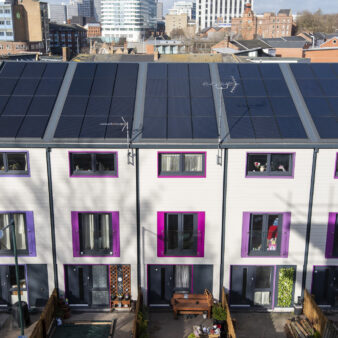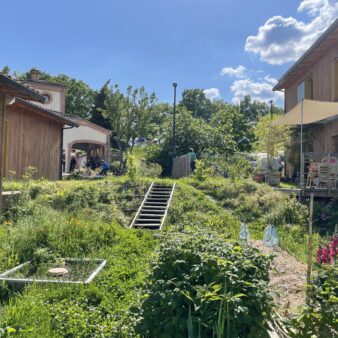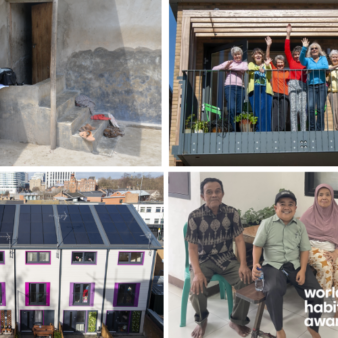
A crisis of secure and affordable housing
Can we still afford a home in our cities? As of 2021, house prices globally are rising at their fastest rate for 40 years far outstripping income increases in most countries. In Europe, at least 100 million people on low and middle incomes spend more than 40 per cent of their disposable income on housing. In the UK alone, 300,000 households could be forced into homelessness by the end of this year. Few would doubt the role of adequate, affordable, secure housing as a foundation of human development, a pillar of social and environmental sustainability, and indeed a basic human right. The pressing question for many is not why or if, but how to deliver the housing we need.
The private housing market, dominated by big profit-led housing developers and ever more shaped by the financialisation of land and housing, is excluding more and more people from home ownership and affordable rental options. At the same time, the social housing sector, part of a welfare model itself under stress, is lacking the capacity to supply sufficient affordable housing for all in need. Overshadowed by these traditionally dominant approaches, Community Led Housing remains a less visible option for policy makers looking to respond to the housing need in their cities.
Communities at the heart of housing development
Community Led housing (CLH) is characterised by a community’s meaningful agency over the housing process: the control, management, and ownership of housing, and the land upon which it is built, being in the hands of a participatory and democratic institution whose principal aim is to materialise the right to housing for its members. It may take a variety of forms, from single-plot co-housing projects to large scale housing cooperatives and community land trusts which provide permanently affordable housing to low- and middle-income groups. In all cases, CLH’s distinguishing feature is that a community-based institution leads the development and management of land and housing.
Partnerships between cities and CLH actors present a particularly promising approach to CLH often referred to as Collaborative Housing: committed to permanent affordability, partner CLH actors benefit from cities providing favourable policies and regulations. Recent experiences in different cities, Barcelona shining bright amongst them, have not only demonstrated that it is possible to place community institutions and organisations at the heart of housing production, but equally that Collaborative Housing free from the burden of profit-generation can deliver far superior wellbeing and sustainability outcomes for residents, for our cities, and for our planet alike. They add to a long established collaborative culture of cooperative housing, (notably in Switzerland, Germany and Austria) that has enabled people to access housing while guarding it from market speculation and commodification, in perpetuity.
What cities can do
The International Social Housing Festival (ISHF) in June 2023 was an opportunity to highlight some promising Collaborative Housing initiatives. In a session organised by urbaMonde and the Network of Cities for Collaborative Housing (NETCO) practitioners and city officials from Barcelona, Brussels, Lyon, the Hague, and Vienna, came together to share how their cities and regions are enabling communities to deliver affordable, sustainable, inclusive housing.
Recognising community-led affordable housing developers as legitimate actors, that are enabled to participate in the production of housing, is a critical precondition on which further policy and finance tools can build on. Institutional recognition of community actors into an inclusive and participatory housing process means harnessing the energy of communities to generate permanently affordable homes, sustainable cities, and cohesive neighbourhoods.
How to enable win-win collaborations between local government and community actors
1. Providing favourable financial schemes, notably by recognising CLH actors as affordable housing providers:
- Direct subsidies on the condition of reduced rents (Vienna)
- Operating and investment subsidies and VAT reduction for real estate transactions (Brussels)
- Refundable grants to cover a part of the development costs (Barcelona)
2. Leasing of public land at a reduced or symbolic price:
- Renewable long-term (75-99 years) land rights and public land leaseholds (Barcelona)
- Discounted sale of public land (Lyon, Vienna)
3. Constituting long-term agreements and collaborations: housing development programme on public land agreed between municipality and CLH actors (Barcelona)
4. Facilitating parternships between co-housing groups and affordable housing providers: projects co-developed by limited-profit and affordable-rent housing developers (Vienna, France)
5. Guaranteeing external financing by banks and investors: municipal financial guarantees for public bank loans (Barcelona).
6. Supporting technical assistance and knowledge-exchange schemes that enable a broader population to engage with collaborative housing (Lyon).
Crucially, mutual trust between CLH actors and local government is a fundamental starting point. In the examples above, city governments and institutions recognise that communities and citizens are legitimate to define their needs and are often best placed to successfully use public funding for the common good. And equally, community actors understand that the processes of local government can be slow and rigid even when the political will is there.
Read the full report of the ISHF session on Cities and Collaborative Housing
At World Habitat we have worked with and learned from Community Led Housing initiatives in various parts of the world. Contact our team to learn more about some of these transformative housing solutions and connect with the people driving the change towards a fairer and greener housing model.




Join the discussion